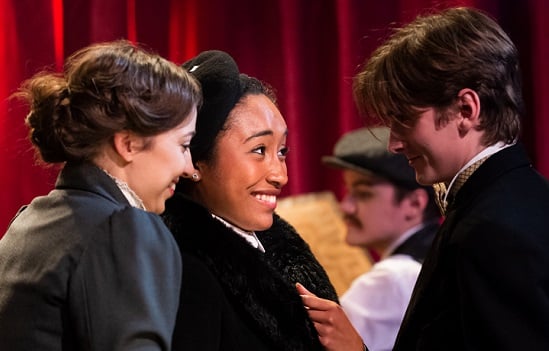
Royal Central School of Speech and Drama students perform 'Lost Empires' in November 2018
Photo: Patrick Baldwin
Diversifying the talent pipeline
Victoria Edwards details a plan to attract students with previously low arts engagement to the Royal Central School of Speech and Drama – and by extension, the creative industries.
The Royal Central School of Speech and Drama’s mission is to develop practitioners and researchers who shape the future of theatre and performance across the UK and beyond. We want to evolve and develop to meet the needs of the industry and profession.
Changing the pipeline
Despite a rapidly growing creative economy, England has a declining national arts curriculum in schools. This will inevitably lead to fewer arts students in higher education and fewer qualified arts graduates, especially from low socio-economic backgrounds. As a training institution, we are the pipeline to the industry. By encouraging a more representative cohort of students who are training to enter the creative industries, we can support positive representation and change in the sector.
Our statistics for the 2017/18 academic year are encouraging, with 470 course applications received from outreach participants in 62 target schools and colleges – a 21% increase on enrolments from outreach participants the previous year. These resulted in 43 offers and 28 enrolments, eight of which arose directly from our East Midlands project. Overall, about 11% of our first year students came from outreach communities this year.
Read more: ‘Uncomfortable messages’ in race equality review at Central School of Speech and Drama
Reaching out
I have worked in higher education for more than 13 years, eight of them at Central supporting student access programmes and managing outreach provision. Central wants to attract and train students who are representative of the diverse range of backgrounds and lived experiences in the UK. Our outreach work aims to create exciting opportunities for young people to experience drama training and to develop the skills and knowledge to access the creative arts. An area of interest for me is supporting students who have lived in care throughout their young lives. I developed a programme that includes membership to the Government’s Care Leaver Covenant so we can provide work-based opportunities for people leaving the care system. I work with each care leaver individually to provide mentoring, signposting, referrals to organisations that can offer career guidance, and up to £1000 a year in financial support.
Our emphasis has been on raising aspiration towards the creative arts in Higher Education and presenting theatre as a possible future option.
For the last six years we have run our flagship outreach programme, a transfer of our autumn term BA Acting: Musical Theatre show (which is produced together with our BA Theatre Practice students) to venues in the East Midlands. Through this, we offer free tickets to shows and workshops, as well as free audition vouchers for those who wish to apply for one of Central’s courses, a process that normally costs £55. Last year, more than over 600 young people came to see our production of 'Lost Empires' at the Haymarket Theatre in Leicester, with 135 of these also attending one of three free workshops. This year we return to the Curve Theatre with our production of 'Boudica'. Alongside the usual free workshops, we will also be running a relaxed performance. Providing an inclusive environment for audiences to engage and participate in theatre in a way that best suits them helps welcome those who may find the conventions of theatre challenging.
We have also focussed on expanding our outreach programme to schools in the East Midlands and the Essex region, geographies that have been identified by the Government as having higher levels of deprivation and lower participation in Higher Education. The programme has been designed to spark further interest in pursuing further education in the arts – we use live performances, specialist workshops and question and answer sessions to engage young people. A survey of workshop participants showed that 87% felt the workshops they’d attended gave them a better understanding of how to apply to study theatre and drama in Higher Education, whilst 82% said they had a better understanding of theatre and drama generally.
Raising aspirations
Core to this project is the idea of offering young people – in particular, those living in deprived areas with little access to the creative arts – the chance to experience conservatoire training workshops and performances and training opportunities outside of London. Many young people in these areas are not only unlikely to progress to Higher Education but are also unlikely to experience theatre and the performing arts firsthand. For these groups, our emphasis has been on raising aspiration towards the creative arts in Higher Education and presenting theatre as a possible future option.
Central’s students often undergo a ‘regional touring’ experience where they get the opportunity to work in a variety of theatre spaces alongside industry professionals. Through this project we can give a flavour of that experience to potential students. Here is one testimonial to its success:
“I would also like to take this opportunity to thank you for inviting us to the performance. It was great for the kids to see something outside of their comfort zone and to have the exposure to a far more abstract piece of theatre. The cast were all fantastic and it really was fascinating to watch. They were absolutely full of it in the car on the way home and couldn't stop discussing it – a dream for any drama teacher!”
We have ambitious plans at Central to build a more class-representative arts sector. By raising the aspirations and achievements of young people in schools, colleges and higher education, we hope to break down class and cultural barriers, improving diversity not only at Central, but in the wider arts sector.
Victoria Edwards is the Access and Participation Manager at The Royal Central School of Speech and Drama.
london.ac.uk
Join the Discussion
You must be logged in to post a comment.